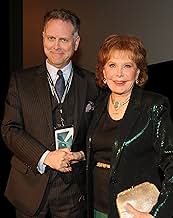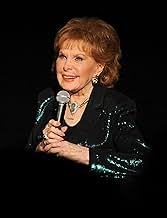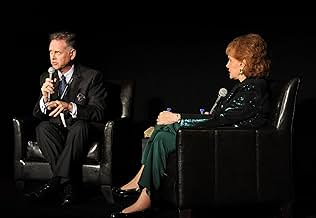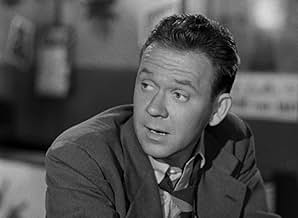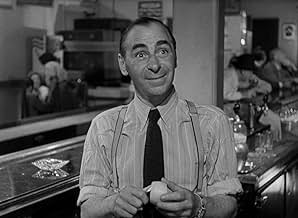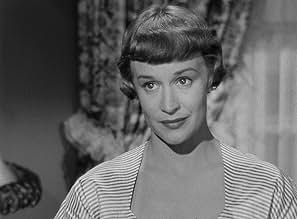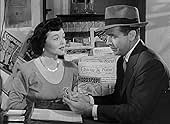IMDb-BEWERTUNG
7,3/10
2945
IHRE BEWERTUNG
Füge eine Handlung in deiner Sprache hinzuEx-con Rocky Mulloy seeks the real culprit in the crime for which he was framed in a night world of deceptive dames and double crosses.Ex-con Rocky Mulloy seeks the real culprit in the crime for which he was framed in a night world of deceptive dames and double crosses.Ex-con Rocky Mulloy seeks the real culprit in the crime for which he was framed in a night world of deceptive dames and double crosses.
- Regie
- Drehbuch
- Hauptbesetzung
Hy Averback
- Bookie
- (as Hy Averbach)
Leon Alton
- Bartender
- (Nicht genannt)
Robert Bice
- Castro's Gunman
- (Nicht genannt)
Ralph Brooks
- Nightclub Patron
- (Nicht genannt)
Paul Cristo
- Waiter
- (Nicht genannt)
Sayre Dearing
- Cop
- (Nicht genannt)
Empfohlene Bewertungen
Dick Powell, born in Mt. View, Arkansas, had a versatile career, starting out as a song and dance man with hit records who starred in some of the best musicals Hollywood ever made several of them by Busby Berkely. When his career floundered he changed genres and became one of the movies' best tough guys, in many ways better in the role than Humphrey Bogart, although Powell never became the cult hero Bogart became. Powell then went on to success in the new medium of television. While "Cry Danger" is no "Murder, My Sweet," it is an exceptional tough guy flick. One thing that always impressed me about Dick Powell, especially well done in "Murder, My Sweet," is his talk. He could read a line like nobody else. His voice helps make "Cry Danger" more realistic and more exciting to watch. William Conrad's Castro is an excellent foil for Powell's character, Rocky Mulloy. This was before the world came to know a real life villain, Fidel Castro. Today, Conrad's character has become even more dastardly as a result of historical events. There is even a freakish resemblance between Conrad's Castro and the cigar-smoking one in Cuba. Thus Conrad's character is even more menacing. Richard Erdman usually gets on my nerves when I see him in a movie. He had a habit of overplaying his part. But in Cry Danger he has been properly cast and comes off a winner. He ends up with some of the best lines in the film. This is the best acting I have seen him do. Rocky (Dick Powell) and Delong(Erdman)have trouble with their women in "Cry Danger." Both Rhonda Fleming and Jean Porter turn in creditable performances and add to the overall effectiveness of the film. One reviewer commented on the photography. And it's true the photography adds much to the overall impact of the movie. The trailer park is shown in such a realistic manner that the viewer can almost see the cockroaches crawl across the table. The action never slows down. The final scene is a good one. Once you start watching "Cry Danger" you won't want to stop.
Among the male stars of the noir cycle, Dick Powell was the most peevish. When Humphrey Bogart smart-talked, it was with a wry bonhomie; when Robert Mitchum did it, it was with mumbled nonchalance. But when Powell snaps back a retort, you know he's got his dander up. This drastic change from his earlier days as happy-go-lucky hoofer began with his assumption (the first) of Philip Marlowe in Murder, My Sweet and continued in Cornered, Johnny O'Clock, To the Ends of the Earth, and The Pitfall. His prickly temper informs Robert Parrish's Cry Danger, the last true noir he would appear in before affecting a pipe and cardigans in The Bad and the Beautiful.
Carrying a grip with the weight of the world in it, Powell steps off a train in Los Angeles; he's just spent five years in prison for a robbery and murder for which he took the rap. Luckily, a war-wounded and hard-drinking Marine (Richard Erdman), with whom he was supposedly drinking when the job was pulled, surfaced to give him an alibi. But Powell has never met this old buddy before.
Nonetheless, they throw their lot together and rent an armadillo-like trailer in a run-down park, where the wife of his old partner (Rhonda Fleming) lives, too. Powell has scores to settle, beginning with big-time bookie William Conrad who, he reckons, owes him $50-grand. Conrad pays off in classic mob fashion, by giving him a tip on a fixed race. The payoff money puts the police on his tail, as its marked bills are part of the take from the old robbery. But all traces of the illegal book have vanished, so Powell can't prove his innocence. He starts stalking Conrad for revenge, even though he's dodging pot-shots in the trailer park, while the duplicity that ensnared him lies much closer to home....
Cry Danger has a number of points in its favor, chief among them the pitiless photography of Joseph Biroc (it's decidedly the low-rent side of the City of Angels). Parrish keeps hustling the story along, nonetheless slowing down enough to allow Erdman a craftily underplayed, memorable performance (the same can't be said of Fleming, who simply lacks the wherewithal to function convincingly as femme fatale). There's a high quotient of violence, too particularly when Powell extracts a confession from Conrad through a one-sided game of Russian Roulette. Somehow, though, the ingenuity of the earlier part of the picture starts to peter out near the end, turning its oddly low-key ending into something of an afterthought.
Carrying a grip with the weight of the world in it, Powell steps off a train in Los Angeles; he's just spent five years in prison for a robbery and murder for which he took the rap. Luckily, a war-wounded and hard-drinking Marine (Richard Erdman), with whom he was supposedly drinking when the job was pulled, surfaced to give him an alibi. But Powell has never met this old buddy before.
Nonetheless, they throw their lot together and rent an armadillo-like trailer in a run-down park, where the wife of his old partner (Rhonda Fleming) lives, too. Powell has scores to settle, beginning with big-time bookie William Conrad who, he reckons, owes him $50-grand. Conrad pays off in classic mob fashion, by giving him a tip on a fixed race. The payoff money puts the police on his tail, as its marked bills are part of the take from the old robbery. But all traces of the illegal book have vanished, so Powell can't prove his innocence. He starts stalking Conrad for revenge, even though he's dodging pot-shots in the trailer park, while the duplicity that ensnared him lies much closer to home....
Cry Danger has a number of points in its favor, chief among them the pitiless photography of Joseph Biroc (it's decidedly the low-rent side of the City of Angels). Parrish keeps hustling the story along, nonetheless slowing down enough to allow Erdman a craftily underplayed, memorable performance (the same can't be said of Fleming, who simply lacks the wherewithal to function convincingly as femme fatale). There's a high quotient of violence, too particularly when Powell extracts a confession from Conrad through a one-sided game of Russian Roulette. Somehow, though, the ingenuity of the earlier part of the picture starts to peter out near the end, turning its oddly low-key ending into something of an afterthought.
Like the old Sinatra song, things can be far better the second time around. The first time I saw "Cry Danger" it was shortly after a viewing of "Murder, My Sweet" and it just couldn't compare to that classic. I recently viewed the movie again and I must say that "Cry Danger" was a lot of fun.
The real stars of the movie are 1) the dialogue, and 2) Dick Powell's delivery of that dialogue. Bogart and Mitchum are blue collar guys who deliver these kinds of one-liners beautifully...and it stings...but Powell has an air of elegance and intelligence wrapped in a white collar, so when he gets caustic, condescending, sarcastic, and nasty, it seems to hurt even more. And it hurts so good. There is nothing more delicious to Noir fans than Powell letting rip with a great one-liner. And the more casual he is, the more "tossed away" the line is delivered, the more we grin with satisfaction. It's just a thing of beauty.
The supporting cast is good, with just about everyone pulling their weight admirably. William Conrad, Regis Toomey, and Rhonda Fleming are in fine form. I was expecting twists, turns, and deceit from Erdman's character, but after an interesting reveal in the beginning of the film, his character seems to be abandoned and left only to provide some comic relief. That missed opportunity aside, though, the script is fun and moves along briskly.
The direction is just fine, though not as dark as I would have liked it...but that is a minor complaint. There is a rawness and realism to these B films that I find much more rewarding than a lot of the glossy A films produced.
8 out of 10 for a thoroughly enjoyable hour and a half crawl through the seedy underbelly of Tinsel Town.
The real stars of the movie are 1) the dialogue, and 2) Dick Powell's delivery of that dialogue. Bogart and Mitchum are blue collar guys who deliver these kinds of one-liners beautifully...and it stings...but Powell has an air of elegance and intelligence wrapped in a white collar, so when he gets caustic, condescending, sarcastic, and nasty, it seems to hurt even more. And it hurts so good. There is nothing more delicious to Noir fans than Powell letting rip with a great one-liner. And the more casual he is, the more "tossed away" the line is delivered, the more we grin with satisfaction. It's just a thing of beauty.
The supporting cast is good, with just about everyone pulling their weight admirably. William Conrad, Regis Toomey, and Rhonda Fleming are in fine form. I was expecting twists, turns, and deceit from Erdman's character, but after an interesting reveal in the beginning of the film, his character seems to be abandoned and left only to provide some comic relief. That missed opportunity aside, though, the script is fun and moves along briskly.
The direction is just fine, though not as dark as I would have liked it...but that is a minor complaint. There is a rawness and realism to these B films that I find much more rewarding than a lot of the glossy A films produced.
8 out of 10 for a thoroughly enjoyable hour and a half crawl through the seedy underbelly of Tinsel Town.
Dick Powell, Rhonda Fleming, Regis Toomey, Richard Erdman, and Jean Porter star in "Cry Danger," a 1951 film directed by Robert Parrish.
Powell plays Rocky Mulloy, an ex-con, recently released from prison after an alibi appears that clears him of a robbery/murder. The alibi is a Marine (Erdman) named DeLong who says that he and Powell were drinking together at the time the job was pulled.
In truth, Powell didn't commit the crime. However, he has never seen this Marine before in his life. The Marine wants money from the robbery.
The two rent a trailer in a trailer park, where the wife (Rhonda Fleming) of his ex-partner, who is still in prison, lives. She's actually an old girlfriend of Rocky's and the two are still attracted to one another.
Rocky goes after a bookie (William Conrad) who cheated him and unknowingly bets on a fixed race, is paid in the robbery money, which sends the police after him.
It's good to read the comments for this film and realize that many people appreciate the versatility and talent of Dick Powell. He was many things to many people - a wonderful singer, a great tough guy, a savvy businessman, a good director, and a marvelous producer who launched Sam Peckinpah and Aaron Spelling. Not all of his later films were "A" productions, but he was always excellent.
The performances by Erdman and Conrad are very good. Rhonda Fleming is her usual beautiful self, and Jean Porter plays a lively party girl.
This is a good noir that captures the atmosphere of post-war LA, the down and out side of it. It's exciting and a little unpredictable, too, enough to keep you watching.
Powell plays Rocky Mulloy, an ex-con, recently released from prison after an alibi appears that clears him of a robbery/murder. The alibi is a Marine (Erdman) named DeLong who says that he and Powell were drinking together at the time the job was pulled.
In truth, Powell didn't commit the crime. However, he has never seen this Marine before in his life. The Marine wants money from the robbery.
The two rent a trailer in a trailer park, where the wife (Rhonda Fleming) of his ex-partner, who is still in prison, lives. She's actually an old girlfriend of Rocky's and the two are still attracted to one another.
Rocky goes after a bookie (William Conrad) who cheated him and unknowingly bets on a fixed race, is paid in the robbery money, which sends the police after him.
It's good to read the comments for this film and realize that many people appreciate the versatility and talent of Dick Powell. He was many things to many people - a wonderful singer, a great tough guy, a savvy businessman, a good director, and a marvelous producer who launched Sam Peckinpah and Aaron Spelling. Not all of his later films were "A" productions, but he was always excellent.
The performances by Erdman and Conrad are very good. Rhonda Fleming is her usual beautiful self, and Jean Porter plays a lively party girl.
This is a good noir that captures the atmosphere of post-war LA, the down and out side of it. It's exciting and a little unpredictable, too, enough to keep you watching.
This film was shot on location in and around the Bunker Hill area of Los Angeles in the 1950's. The seedy trailer park, the crummy cocktail bars, and the Union Station (built in 1939) are the backdrop for a much better than average tale of revenge. Dick Powell gets off a train at the Union Station after spending 5 years in prison for a crime he didn't commit. He is met by a cop (Regis Toomey) that thinks he not only did the crime, but that he has stashed the loot. Also on the welcoming committee is Richard Erdman as an alcoholic former Marine that provided Powell with an alibi that got him out of prison. Rhonda Fleming plays the wife of a pal of Powell's that remains in prison for the crime. Powell intends to prove not only his innocence, but that of his buddy.
Add to the mix William Conrad as a bad guy with his own agenda and you have a better than average noir. The dialog between Powell and Erdman is dark and funny at the same time. The cinematography captures a part of Los Angeles that fell under the urban renewal wrecking ball that ripped the soul out of this part of the city. Not the greatest film noir ever made, but one of my favorites. Why isn't this film out on DVD?
Add to the mix William Conrad as a bad guy with his own agenda and you have a better than average noir. The dialog between Powell and Erdman is dark and funny at the same time. The cinematography captures a part of Los Angeles that fell under the urban renewal wrecking ball that ripped the soul out of this part of the city. Not the greatest film noir ever made, but one of my favorites. Why isn't this film out on DVD?
Wusstest du schon
- WissenswertesIn an interview with Tom Weaver, Jean Porter said the film was "directed by Dick Powell, and he wasn't given director credit. Dick gave Robert Parrish the director's credit, but Dick did all the directing."
- PatzerAs Rocky drives away after dropping Nancy off at work, the cameraman and camera are reflected in the car's rear window glass.
- Zitate
Darlene LaVonne: You drinkin' that stuff so early?
Delong: Listen, doll girl, when you drink as much as I do, you gotta start early.
- VerbindungenEdited from Crack-Up (1946)
Top-Auswahl
Melde dich zum Bewerten an und greife auf die Watchlist für personalisierte Empfehlungen zu.
- How long is Cry Danger?Powered by Alexa
Details
- Erscheinungsdatum
- Herkunftsland
- Offizielle Standorte
- Sprache
- Auch bekannt als
- Peligro
- Drehorte
- New Grand Hotel - 257 Grand Avenue, Bunker Hill, Downtown, Los Angeles, Kalifornien, USA(Crosley Hotel - exteriors and interors)
- Produktionsfirmen
- Weitere beteiligte Unternehmen bei IMDbPro anzeigen
- Laufzeit1 Stunde 19 Minuten
- Farbe
- Seitenverhältnis
- 1.33 : 1
Zu dieser Seite beitragen
Bearbeitung vorschlagen oder fehlenden Inhalt hinzufügen



